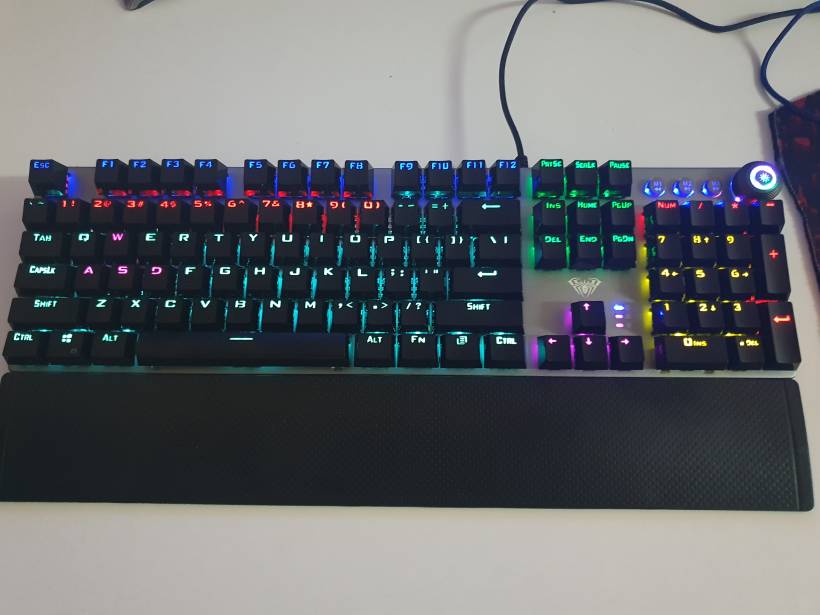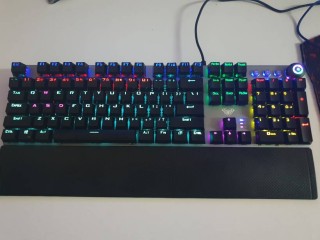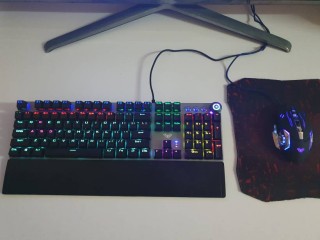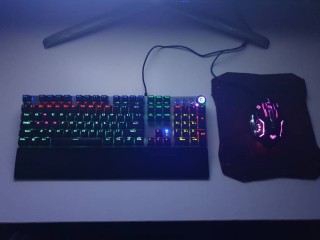In 2020, I decided to upgrade my gaming setup with the Aula F2058 mechanical keyboard. Attracted by its futuristic design and budget-friendly price point, I was eager to experience the tactile feedback and performance it promised. The keyboard featured a full-sized layout with a black brushed metal finish, complemented by a detachable ergonomic wrist rest designed to reduce fatigue during extended gaming sessions. The blue LED backlighting, with multiple brightness levels and lighting effects, added a visually appealing touch to my gaming environment.
During the initial years, the Aula F2058 delivered impressive performance. Equipped with independent suspension key switches that mimicked the feel of Cherry MX Blue switches, each key was rated for up to 60 million keystrokes. The anti-ghosting technology and 26-key rollover ensured that all my commands were registered accurately, even during intense gaming moments. The dedicated multimedia controls and Windows key lock function added convenience, allowing me to manage media and prevent accidental game interruptions seamlessly.
However, after three years of consistent use, I began to notice issues with certain keys, particularly the heavily utilized WASD keys. These keys started to register double presses, leading to unintended movements and actions during gameplay. This phenomenon, often referred to as "double typing" or "chattering," is a common issue in mechanical keyboards as they age. Factors such as dust accumulation, wear on the switches, or firmware glitches can contribute to this problem. Users have reported similar experiences, noting that frequently used keys tend to develop such issues over time.
In an attempt to resolve the issue, I removed the affected keycaps and cleaned the switches thoroughly, ensuring there was no debris causing the malfunction. Despite these efforts, the double-pressing persisted, indicating a deeper issue possibly related to the switch's internal mechanism. While some enthusiasts opt to replace individual switches, this process requires technical expertise and equipment, which I lacked. Moreover, considering the keyboard had already served me well for three years, I contemplated whether investing time and resources into repairs was the best course of action.
Ultimately, I decided to replace the Aula F2058 with the Corsair K55 keyboard. Although the K55 is a membrane keyboard, it boasts features such as customizable RGB backlighting, dedicated macro keys, and a detachable wrist rest. While it lacks the distinct tactile feedback of a mechanical keyboard, its reliable performance and additional functionalities have made it a worthy successor in my gaming setup.
Reflecting on my experience with the Aula F2058, I remain satisfied with its performance during its lifespan. Its affordability and feature-rich design provided excellent value for a significant period. However, the onset of the double-typing issue highlights a common challenge with mechanical keyboards: the potential for key switch wear over time. For users experiencing similar issues, it's advisable to consult the manufacturer's support resources or consider professional repair services. Regular maintenance, such as periodic cleaning, can also help prolong the lifespan of mechanical keyboards.
In conclusion, while the Aula F2058 served me well for three years, the eventual key switch issues prompted me to explore alternative options. The transition to the Corsair K55 has been smooth, offering a different yet satisfying typing experience. This journey underscores the importance of balancing performance, durability, and maintenance in selecting peripherals that align with one's gaming and typing needs.
In light of my experience with the Aula F2058, I've also decided to upload the keyboard drivers as a backup, just in case the manufacturer removes them from their official website. This is a fairly common issue with Chinese and Taiwanese peripheral brands, where older products eventually disappear from their support pages, leaving users stranded without essential drivers or software. If you're still using the Aula F2058 and need the drivers, you might want to download and store a copy for future use.










Comments